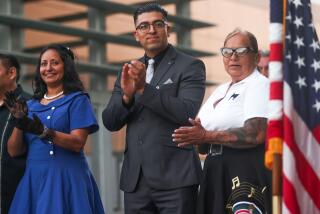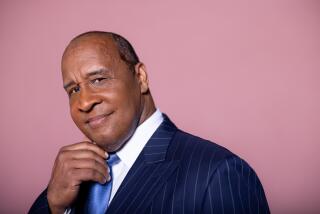Eastwood No ‘Dirty Harry’ in Last Scene as Mr. Mayor
CARMEL, Calif. — Before Clint Eastwood became America’s most famous small-town mayor, he was best known as Dirty Harry Callahan, the surly police detective who carried a pistol the size of a dachshund. Dirty Harry was unaccustomed to patiently articulating his point of view and explaining his actions. If anyone disagreed with him he could simply whip out his oversized .44-caliber pistol and blow them away.
But at Eastwood’s last City Council meeting--his two-year terms ends Tuesday--he seemed like just another small town mayor. Eastwood, who is balding and wore reading glasses and a gray sports coat, patiently listened as residents complained about young punks on skateboards drinking, causing trouble and disrupting the neighborhood.
Dirty Harry could have quickly cleared up the problem with one of his patented apoplectic glares. But Mayor Eastwood could only listen patiently, make a few notes and then vote to ban skateboarding in the neighborhood.
Although Eastwood the mayor is more subdued than Eastwood the actor, his presence still creates a furor. His final City Council meeting last week attracted a full press gallery and a capacity crowd of more than 250 people, with dozens of Instamatic-toting tourists lined up outside waiting for seats. Before Eastwood was elected, the monthly meetings were held at the cozy 50-seat council chambers, but because of the overflow crowds, they were soon moved to the larger Carmel Women’s Club.
The novelty of a movie-star mayor has worn off long ago for most residents and they have grown tired of tourists badgering them about Eastwood or The Hog’s Breath Inn, the Carmel restaurant in which he owns a one-sixth share.
“People used to stop you on the street and ask you where’s the Carmel Mission or the beach,” said resident Kay Pallastrini. “Now they all stop you and ask: ‘Where is he? .’ They all want to know how to find the Hog’s Breath or how to find City Hall.”
Eastwood’s legacy as mayor, some residents say, is not so much what he did, but who he was. His notoriety had a greater impact on Carmel than any zoning decision, or development project he voted on.
‘Nothing Like This’
“We’ve always had tourists in Carmel, but nothing like this,” said Marjory Lloyd, a board member of Carmel Heritage, a historical society.
“Because we’ve had a celebrity mayor the crowds have been enormous--I won’t even go into town on the weekends now. And the type of visitors are different. We’re getting a lot of people who come in on tour buses because of all the publicity, stay a few hours and leave. The people who used to come for a week for the cultural events are staying away.”
After Eastwood was elected, City Hall got about 50 letters a day from fans throughout the country. And today, two years after the election, the fervor has not subsided. Eastwood still gets fan mail every day at City Hall and the tourists still scour city offices hoping for a glimpse of the actor.
But Eastwood was more than a cynosure for gawkers, more than a figurehead mayor. Although one of his first acts as mayor was not high political drama--he fought a city ordinance that effectively forbade the sale of ice cream cones--during his two years in office he has made a number of key decisions. And he has pushed through projects that could influence Carmel for years to come.
“I think our greatest contribution was we got things done; we got things moving again,” said Eastwood in an interview after his last City Council meeting. “There was a do-nothing period in Carmel for awhile where everybody just talked about things. I think we changed that.”
At the City Council meeting, Eastwood discussed issues in the gravelly, slightly ominous-sounding voice that became his trademark since the “Dirty Harry” movies debuted in the early 1970s. But while the other council members studiously pored over the agenda and addressed items with the solemnity of a parole board, Eastwood often appeared bemused and frequently quipped with residents.
Eastwood is credited with resolving a number of long-standing problems in Carmel. He accelerated construction of a new set of stairways to Carmel’s beach and sped up completion of a public pathway along the bluffs; pushed through a decades-old plan for a new library annex, and resolved a controversy over development of the 66-acre Mission Ranch, an old dairy farm converted into a bed-and-breakfast resort. He bought the place himself for about $5 million and vowed to preserve its semi-rural nature.
Eastwood was swept into office two years ago with 72% of the vote, and probably would have won again, but not by as large a margin, said Mac McDonald, managing editor of the Carmel Pine Cone, the community’s weekly newspaper. Eastwood, however, decided not to run again because he wanted to spend more time with his two children.
Has Drawn Criticism
Although Eastwood’s decisive style was popular, he drew criticism from some residents who said he is too pro-development and his policies could inalterably change the character of Carmel. Eastwood and his City Council supporters have proposed building parking garages in a residential district, rezoning a large chunk of city land for much higher density than previously allowed and selling city-owned parkland for development.
And, said Councilman Jim Wright, during Eastwood’s tenure there has been a shift in the allocation of water permits. Previously residents were considered first, but under Eastwood, downtown businesses got top priority, contended Wright, a consistent Eastwood opponent.
Eastwood also has been criticized for ignoring potential conflict-of-interest situations. His architect applied for a water meter permit for a commercial building site Eastwood owned, only hours before a building moratorium was slapped on the city by the local water board.
“We advised the city at 3 p.m. that we were going to impose the moratorium that evening,” said Dick Heuer, former chairman of the Water Management District board. “At shortly before 5 p.m., Clint’s architect came in with the application. . . . It certainly looked very bad. I feel very strongly that a public official should avoid any appearance of conflict of interest. If I’d been in Eastwood’s shoes I would have withdrawn that application very hastily. But he did not.”
Eastwood said the timing of the application was not based on inside information. “My project had already been approved by the previous Administration. . . . Heuer’s just crying because he’s not chairman anymore. He’s mad because I’m fighting for Carmel.”
Residents Form Group
Citizens concerned about Eastwood’s policies formed the Carmel Residents Assn. and they quickly attracted almost 500 members, about 10% of Carmel’s population.
“We got so many members so quickly because people were very concerned about what Eastwood was doing,” said Jane Mayer, a co-founder of the association. “We’re upset about the commercialization of a residential town.”
The previous city Administration, Eastwood said, was openly hostile to the business community. And he decided to run for mayor after city officials turned down his plans to remodel a commercial building next to the restaurant he co-owns. But, Eastwood said, his Administration was not pro-business, just more evenhanded in its approach to residential and commercial interests.
“I didn’t come to Carmel to live in urban sprawl,” he said. “I can make a movie and do a hell of a lot better than what I make from owning one-sixth of a restaurant here.”
As the rhetoric of small town politics proceeds apace, Eastwood leaves office as he entered it--amid a swirl of publicity and controversy.
Eastwood has been accused of dirty politics in the campaign for his successor.
Endorses a Friend
The controversy arose when Eastwood criticized some candidates for mayor and the City Council in his weekly “Mayor’s Column” in the Carmel Pine Cone, and endorsed a mayoral candidate who is also a close friend. But some residents claimed that Eastwood distorted the facts and that the mudslinging was unseemly for a small town election.
Eastwood, for example, dredged up a 25-year-old Portland, Ore., newspaper article and quoted a few sentences to buttress his claims that Clayton Anderson, a former Washington state parks director, left a position “under some controversy.”
“After reading these articles,” Eastwood wrote, “it is hard not to question the leadership ability that we’re now asked to vote for.”
But the Monterey Herald pointed out that Eastwood quoted selectively and failed to print other pertinent parts of the article, which were extremely complimentary.
“I can see why they call him Dirty Harry,” said Ben Heller, a founder of the Carmel Residents Assn. “We’re not used to sleazy campaigns like this.”
‘I’m an Amateur’
But Eastwood said: “I didn’t get into any personal stuff in the column, I just pointed out some things that had been printed in a very respectable publication. . . . Maybe I left some things out. But I’m an amateur. I’m not an investigative reporter.”
When Eastwood leaves office, Clintville, a shop opened to peddle “Make My Day” T-shirts and other Eastwood memorabilia, will remain open indefinitely. Paul Laub, who opened the shop two years ago, said the Eastwood-as-mayor aura will not diminish when his term ends.
“Elvis is dead, but isn’t Graceland still popular with tourists?” Laub asked.
More to Read
Sign up for Essential California
The most important California stories and recommendations in your inbox every morning.
You may occasionally receive promotional content from the Los Angeles Times.










